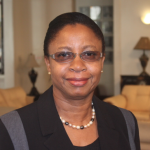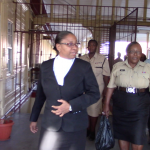
By Svetlana Marshall
Attorney General, Senior Counsel Anil Nandlall clashed with the Counsel for the Guyana Elections Commission (GECOM), Kurt DaSilva today in the High Court over the issue of residency for Regional Elections. This came after Acting Chief Justice, Roxane George delayed her ruling in the house-to-house verification case to hear additional submissions.
Relying heavily on Article 73 (1) of the Constitution, Mr. DaSilva went at lengths to explain that residency is still a Constitutional requirement for Guyanese to vote in Regional Elections, and that the addresses provided by persons seeking to register for those elections must be verified.
Article 73 (1) states that “Members of a Regional Democratic Council shall be elected by persons residing in the Region and registered as electors for the purpose of Article 159.”
The GECOM Counsel argued that traditionally General and Regional Elections in Guyana have been held simultaneously using a single List of Electors, because prior to 2022, the addresses provided by persons seeking to register, were verified in accordance with the National Registration Act.
However, he stated that with the passage of the National Registration (Amendment) Act of 2022, verification of residence is no longer required when registering to vote in the General Elections, but he maintained that the requirement is still Constitutionally in place for Regional Elections.
“Yes, the General and Regional Elections have been held together for decades, but what was also done for decades is that persons were registered on the basis of their residence. All of that was changed in 2022″, DaSilva told the Court.
He said the amendments in 2022 have given rise to particular challenges that must be addressed.
“So, yes, General and Regional Elections have been held for decades but that is not a reason to doing the same thing if a fundamental change has occurred, which now affects the constitutional requirement,” the GECOM Counsel stated.
He argued that verification of residence must be done before anyone is allowed to register for the Regional Elections.
“Anyone voting for a Regional Democratic Council must, in addition to being registered, must be residing in the Region,” DaSilva told the Court.
He said in amending the National Registration Act, the Government failed to take other important provisions provided for both Regional and Local Elections into consideration.
The arguments put forward by the GECOM Counsel did not sit well with the Attorney General, who told the Court that the Counsel’s position contradicts the position of the Guyana Elections Commission.
Senior Counsel Nandlall told the Court that Article 159, which sets the conditions for voting in Guyana, is superior to Article 73, and must be upheld. That article, he said, clearly establishes that residency is not a requirement for voting in Guyana.
As such, he argued that verification of residence is not required for either General or Regional Elections, noting that the National Registration Act was amended in 2022 to bring it in conformity with the Constitution, more so, Article 159.
“Once you provide an address, it matters not, it could be the High Court building, that is your address, that is your address. All you need is an address for it to determine where you will vote,” the Attorney General told reporters outside the court.
He said too that DaSilva’s arguments are deeply flawed.
“Unfortunately, you heard GECOM’s lawyer making some very very uninformed, uneducated, and I say that with the greatest of respect and the deepest of regret, some very very uninitiated submissions. Submissions that lacked clarity, lacked common sense and are not consistent with the law,” the Attorney General told reporters.
He said the application brought by People’s National Congress Reform’s Chief Scrutineer, Carol Smith Joseph, is a “red herring” that was thrown in to delay the upcoming General and Regional Elections.
The Chief Justice will now hand down her ruling in this matter on April 3, 2025.













You must be logged in to post a comment Login